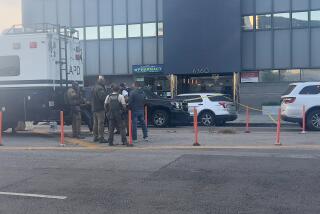Accused WWII Nazi in Kansas Shootout
- Share via
KANSAS CITY, Kan. — A man who was accused Tuesday of being a Nazi death camp guard fired at reporters and police outside his home before he was shot in the leg by officers.
About 90 minutes before the shooting, the Justice Department filed papers in federal court seeking to strip Michael Kolnhofer, 79, of his naturalized U.S. citizenship. Officials allege he concealed his concentration camp ties when he applied for citizenship in 1952.
Kolnhofer’s attorney said he denies being a concentration camp guard, but Kolnhofer’s niece told WDAF-TV that he admitted two years ago to having been a guard in two concentration camps but that he hadn’t hurt anyone.
WDAF reporter Teri Schaefer, who went to Kolnhofer’s home Tuesday, also said he admitted having been a death camp guard.
After Schaefer walked away from the house, Kolnhofer went inside and returned with a gun. He waved the gun at reporters, yelling at them to leave. When police were called to the scene, he fired shots and police returned fire.
Kolnhofer was shot at least once in the leg and was taken to the University of Kansas Medical Center, where he was listed in serious but stable condition.
No other injuries were reported.
Robert DeCoursey, a local attorney, said Kolnhofer contacted him about 10 days ago to discuss his citizenship. Kolnhofer told DeCoursey that he was born in Croatia and conscripted into the German army during World War II.
The Justice Department released information only about Kolnhofer’s alleged Nazi service and nothing about his life in the United States. If his citizenship was revoked, the government could try to deport him.
The Justice Department alleges that Kolnhofer was an SS guard during World War II at the Sachsenhausen concentration camp in Germany. Citing captured wartime Nazi records, the Justice Department said Kolnhofer became a member of the SS Death’s Head Guard Battalion at Sachsenhausen, near Berlin, in 1943, serving as a guard for one year.
SS personnel records show that Kolnhofer was transferred in 1944 to the Buchenwald concentration camp near Weimar, Germany.
A neighbor who witnessed the shooting said she knew the man only as Mike.
“I just hate to see all this happen, because he’s been so nice to us,” said the neighbor, who gave her name only as Carol.
More to Read
Sign up for Essential California
The most important California stories and recommendations in your inbox every morning.
You may occasionally receive promotional content from the Los Angeles Times.










